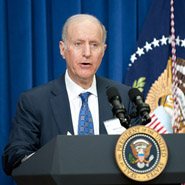News
The widening "justice gap" and why we must close it
- 4/24/2012
- Legal Services Corporation
 A trusting widow, swindled by a smooth-talking loan shark, suddenly faces eviction from the home she’s owned for decades. An injured veteran caught in bureaucratic red tape is denied services he needs and has earned. A fearful mother stays in an abusive relationship because the alternatives seem worse. These disturbing situations are all-too common in our great country. Without appropriate legal expertise, many of them have unjust endings. The good news is, legal assistance is available to help with issues like these for many vulnerable, low-income Americans. Civil legal assistance programs funded by the Legal Services Corporation (LSC) are located in every state and are great public-private partnerships, obtaining, on average, more than half of their support from non-federal sources together with significant donations of time from private attorneys.
A trusting widow, swindled by a smooth-talking loan shark, suddenly faces eviction from the home she’s owned for decades. An injured veteran caught in bureaucratic red tape is denied services he needs and has earned. A fearful mother stays in an abusive relationship because the alternatives seem worse. These disturbing situations are all-too common in our great country. Without appropriate legal expertise, many of them have unjust endings. The good news is, legal assistance is available to help with issues like these for many vulnerable, low-income Americans. Civil legal assistance programs funded by the Legal Services Corporation (LSC) are located in every state and are great public-private partnerships, obtaining, on average, more than half of their support from non-federal sources together with significant donations of time from private attorneys.
The bad news is these programs because of inadequate funding are forced to turn away as many or more people as they can help. In the wake of the recession, nearly 1 in 5 Americans—63 million people—now qualify for LSC-funded civil legal assistance because they live at or below 125% of the federal poverty guideline. That is an all-time high. In addition, as demand has been rising, the combined funding for LSC programs from federal, IOLTA, state, local and all other sources has dropped from $960 million in 2010 to $878 million in 2012. As a result, our programs throughout the country have been forced in the past 2 years to lay off 13% of their attorneys, 15% of their paralegals and 12 % of their support staff.
The “justice gap” – the disparity between the need for and availability of civil legal services – is widening. And it affects everyone, not just those with unmet legal needs.
Earlier this week, at an important White House forum co-hosted with the Legal Services Corporation (LSC), President Obama spoke to a distinguished group of public policy leaders who had gathered to discuss the state of civil legal assistance for low-income Americans. U.S. Attorney General Eric Holder, State Department Legal Adviser Harold Koh, former Pennsylvania governor and U.S. Attorney General Richard Thornburgh, Mississippi Supreme Court Justice Jess H. Dickinson, Illinois Attorney General Lisa Madigan and others confirmed again and again that making access to legal aid available for low-income Americans is absolutely critical to the health of our communities, our courts, our country and our collective belief in the fairness of our justice system.
Each of these important leaders, as well as the six directors of LSC-funded programs from across the nation who participated, emphasized that access to justice for low-income Americans is essential, and that it must be provided through a collaboration of federally funded legal aid programs, the private bar, the courts, and others.
They also reminded us that legal aid is fundamental to community stability, and necessary for true economic recovery. States and communities benefit when low-income citizens have access to civil legal assistance – families living in decent housing do not need emergency shelter and they have fewer medical problems, and when victims of domestic abuse are safe, governments spend less on medical care, mental health services, policing and courts.
In his remarks, the president sounded a deeper theme. Making civil legal assistance available to low-income Americans is “central to our notion of equal justice under the law,” he said as he pledged to be a “fierce defender and advocate” for legal services.
Nothing is more quintessentially American than the promise of “equal justice for all.” The very first line of our Constitution emphasizes that establishing justice is a core purpose of our national government: “We the people of United States, in order to form a more perfect Union, establish Justice . . .”
What does “justice for all” look like in real life? When a veteran is able to get the benefits he or she has earned in service to our country, when an elderly couple averts an unlawful foreclosure and is able to stay in their home, when a single parent irrespective of her means is able to keep herself and her children safe from an abuser – this is what justice for all looks like.
As the distinguished jurist Learned Hand observed more than 60 years ago, “If we are able to keep our democracy, there must be one commandment: Thou shall not ration justice.”
Levi is chairman of the Legal Services Corporation Board of Directors.
- Pro Bono/Legal Services